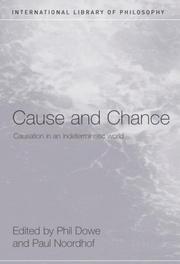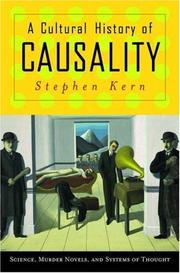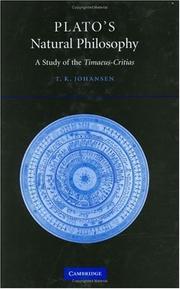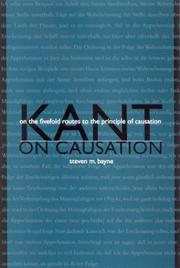| Listing 1 - 5 of 5 |
Sort by
|

ISBN: 0415300983 9780415408486 1134419279 1280024860 0203494660 9780203494660 9780415300988 9786610024865 6610024863 9781134419272 9781134419227 1134419228 9781134419265 1134419260 0415408482 9781280024863 Year: 2004 Volume: *18 Publisher: London ; New York : Routledge,
Abstract | Keywords | Export | Availability | Bookmark
 Loading...
Loading...Choose an application
- Reference Manager
- EndNote
- RefWorks (Direct export to RefWorks)
Causaliteit --- Causalité --- Causation --- Oorzakelijkheid --- Causation. --- Causality --- Cause and effect --- Effect and cause --- Final cause --- Beginning --- God --- Metaphysics --- Philosophy --- Necessity (Philosophy) --- Teleology

ISBN: 0691115230 0691127689 9786612157806 1282157809 1400826233 9781400826230 9780691115238 9780691127682 Year: 2004 Publisher: Princeton Princeton University Press
Abstract | Keywords | Export | Availability | Bookmark
 Loading...
Loading...Choose an application
- Reference Manager
- EndNote
- RefWorks (Direct export to RefWorks)
This pioneering work is the first to trace how our understanding of the causes of human behavior has changed radically over the course of European and American cultural history since 1830. Focusing on the act of murder, as documented vividly by more than a hundred novels including Crime and Punishment, An American Tragedy, The Trial, and Lolita, Stephen Kern devotes each chapter of A Cultural History of Causality to examining a specific causal factor or motive for murder--ancestry, childhood, language, sexuality, emotion, mind, society, and ideology. In addition to drawing on particular novels, each chapter considers the sciences (genetics, endocrinology, physiology, neuroscience) and systems of thought (psychoanalysis, linguistics, sociology, forensic psychiatry, and existential philosophy) most germane to each causal factor or motive. Kern identifies five shifts in thinking about causality, shifts toward increasing specificity, multiplicity, complexity, probability, and uncertainty. He argues that the more researchers learned about the causes of human behavior, the more they realized how much more there was to know and how little they knew about what they thought they knew. The book closes by considering the revolutionary impact of quantum theory, which, though it influenced novelists only marginally, shattered the model of causal understanding that had dominated Western thought since the seventeenth century. Others have addressed changing ideas about causality in specific areas, but no one has tackled a broad cultural history of this concept as does Stephen Kern in this engagingly written and lucidly argued book.
History of civilization --- Literature --- anno 1900-1999 --- anno 1800-1899 --- #KVHA:Literaire kritiek --- #KVHA:Causaliteit --- #KVHA:Moord --- #KVHA:Thematische literatuurstudie --- Causation in literature. --- Causation. --- Fiction --- Murder in literature. --- History and criticism. --- Causality --- Cause and effect --- Effect and cause --- Final cause --- Beginning --- God --- Metaphysics --- Philosophy --- Necessity (Philosophy) --- Teleology --- Causation --- Causation in literature --- Murder in literature --- History and criticism

ISBN: 0521790670 9781107321342 1107321344 9780511839610 0511839618 9780521790673 9780521067485 1139809644 9781139809641 1107315956 9781107315952 1107316901 9781107316904 1107317886 9781107317888 1299399185 9781299399181 1107314976 9781107314979 0511518471 9780511518478 0521067480 Year: 2004 Publisher: Cambridge : Cambridge University Press,
Abstract | Keywords | Export | Availability | Bookmark
 Loading...
Loading...Choose an application
- Reference Manager
- EndNote
- RefWorks (Direct export to RefWorks)
Plato's dialogue the Timaeus-Critias presents two connected accounts, that of the story of Atlantis and its defeat by ancient Athens and that of the creation of the cosmos by a divine craftsman. This book offers a unified reading of the dialogue. It tackles a wide range of interpretative and philosophical issues. Topics discussed include the function of the famous Atlantis story, the notion of cosmology as 'myth' and as 'likely', and the role of God in Platonic cosmology. Other areas commented upon are Plato's concepts of 'necessity' and 'teleology', the nature of the 'receptacle', the relationship between the soul and the body, the use of perception in cosmology, and the work's peculiar monologue form. The unifying theme is teleology: Plato's attempt to show the cosmos to be organised for the good. A central lesson which emerges is that the Timaeus is closer to Aristotle's physics than previously thought.
Philosophy, Ancient --- Cosmology, Ancient --- Teleology --- Necessity (Philosophy) --- Philosophie ancienne --- Cosmologie antique --- Téléologie --- Nécessité (Philosophie) --- History --- Histoire --- Plato. --- Cosmology --- Early works to 1800. --- Cosmology. --- Teleology. --- Téléologie --- Nécessité (Philosophie) --- Design in natural phenomena, Study of --- Final cause --- Philosophy --- Causation --- Evolution --- Astronomy --- Deism --- Metaphysics --- Criticism and interpretation. --- Arts and Humanities --- Cosmology - Early works to 1800. --- Teleology - Early works to 1800.
Book
ISBN: 0262270668 1417560371 9780262270663 9781417560370 Year: 2004 Publisher: Cambridge, Mass. MIT Press
Abstract | Keywords | Export | Availability | Bookmark
 Loading...
Loading...Choose an application
- Reference Manager
- EndNote
- RefWorks (Direct export to RefWorks)
One philosophical approach to causation sees counterfactual dependence as the key to the explanation of causal facts: for example, events c (the cause) and e (the effect) both occur, but had c not occurred, e would not have occurred either. The counterfactual analysis of causation became a focus of philosophical debate after the 1973 publication of the late David Lewis's groundbreaking paper, "Causation," which argues against the previously accepted "regularity" analysis and in favor of what he called the "promising alternative" of the counterfactual analysis. Thirty years after Lewis's paper, this book brings together some of the most important recent work connecting--or, in some cases, disputing the connection between--counterfactuals and causation, including the complete version of Lewis's Whitehead lectures, "Causation as Influence," a major reworking of his original paper. Also included is a more recent essay by Lewis, "Void and Object," on causation by omission. Several of the essays first appeared in a special issue of the Journal of Philosophy, but most, including the unabridged version of "Causation as Influence," are published for the first time or in updated forms. Other topics considered include the "trumping" of one event over another in determining causation; de facto dependence; challenges to the transitivity of causation; the possibility that entities other than events are the fundamental causal relata; the distinction between dependence and production in accounts of causation; the distinction between causation and causal explanation; the context-dependence of causation; probabilistic analyses of causation; and a singularist theory of causation.
Causation. --- Counterfactuals (Logic) --- Causality. --- Causation --- Enabling Factors --- Multifactorial Causality --- Multiple Causation --- Predisposing Factors --- Reinforcing Factors --- Causalities --- Causalities, Multifactorial --- Causality, Multifactorial --- Causation, Multiple --- Causations --- Causations, Multiple --- Enabling Factor --- Factor, Enabling --- Factor, Predisposing --- Factor, Reinforcing --- Factors, Enabling --- Factors, Predisposing --- Factors, Reinforcing --- Multifactorial Causalities --- Multiple Causations --- Predisposing Factor --- Reinforcing Factor --- Contrary-to-fact conditional --- Counterfactual conditionals --- Causality --- Cause and effect --- Effect and cause --- Final cause --- Conditionals (Logic) --- Logic --- Beginning --- God --- Metaphysics --- Philosophy --- Necessity (Philosophy) --- Teleology --- PHILOSOPHY/General

ISBN: 0791485897 1417575700 9781417575701 9780791485897 0791459012 9780791459027 0791459020 9780791459010 Year: 2004 Publisher: Albany, NY : State University of New York Press,
Abstract | Keywords | Export | Availability | Bookmark
 Loading...
Loading...Choose an application
- Reference Manager
- EndNote
- RefWorks (Direct export to RefWorks)
Kant famously confessed that Hume's treatment of cause and effect woke him from his dogmatic slumber. According to Hume, the concept of cause does not arise through reason, but through force of habit. Kant believes this can be avoided through the development of a revolutionary new cognitive framework as presented in the Critique of Pure Reason. Focusing on the Second Analogy and other important texts from the first Critique, as well as texts from the Critique of Judgment, the author discusses the nature of Kant's causal principle, the nature of his proof for this principle, and the status of his intended proof. Bayne argues that the key to understanding Kant's proof is his discussion of objects of representations, and that it is his investigation into the requirements for an event's being an object of representations that enables him to develop his proof of the causal principle.
Causation. --- Causality --- Cause and effect --- Effect and cause --- Final cause --- Beginning --- God --- Metaphysics --- Philosophy --- Necessity (Philosophy) --- Teleology --- Kant, Immanuel, --- Kant, Immanuel --- Kant, I. --- Kānt, ʻAmmānūʼīl, --- Kant, Immanouel, --- Kant, Immanuil, --- Kʻantʻŭ, --- Kant, --- Kant, Emmanuel, --- Ḳanṭ, ʻImanuʼel, --- Kant, E., --- Kant, Emanuel, --- Cantơ, I., --- Kant, Emanuele, --- Kant, Im. --- קאנט --- קאנט, א. --- קאנט, עמנואל --- קאנט, עמנואל, --- קאנט, ע. --- קנט --- קנט, עמנואל --- קנט, עמנואל, --- كانت ، ايمانوئل --- كنت، إمانويل، --- カントイマニユエル, --- Kangde, --- 康德, --- Kanṭ, Īmānwīl, --- كانط، إيمانويل --- Kant, Manuel, --- Causation
| Listing 1 - 5 of 5 |
Sort by
|

 Search
Search Feedback
Feedback About
About Help
Help News
News